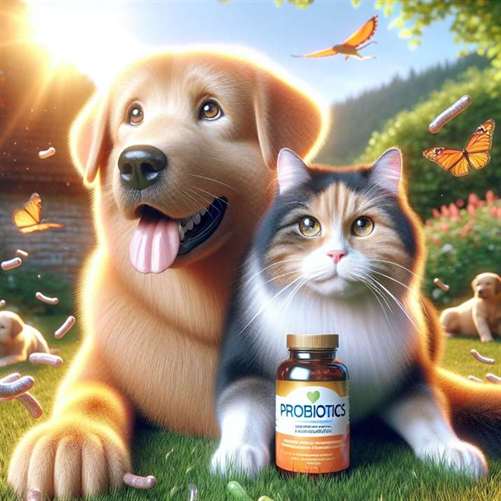What Can Probiotics Do for Dogs and Cats?
Introduction
Have you ever wondered what benefits probiotics can bring to our beloved pets? As pet owners become increasingly interested in holistic health solutions, the question of What Can Probiotics Do for Dogs and Cats has gained significant attention. Probiotics, often heralded as “good bacteria,” play a crucial role in maintaining gut health not just for humans, but for our furry companions as well. Recent studies suggest that probiotics can positively influence various aspects of pet health, from digestion to immune function, making them a hot topic among veterinarians and pet owners alike.
The importance of gut health cannot be overstated. Just like in humans, a balanced gut microbiome is essential for dogs and cats to thrive. In fact, the gut houses approximately 70% of the immune system, meaning that a healthy gut can lead to a stronger immune response. This has sparked a movement within the pet care industry, prompting many pet parents to incorporate probiotics into their pets’ diets. If you’re curious about how probiotics work and what they can do for your pets, you’re in the right place!
To dive deeper into this fascinating topic, check out our comprehensive guide on maintaining a healthy balanced diet for your pets.
What is What Can Probiotics Do for Dogs and Cats?
Definition
What Can Probiotics Do for Dogs and Cats refers to the various health benefits that probiotics can provide to our pets. In simple terms, probiotics are live microorganisms that, when administered in adequate amounts, confer a health benefit on the host—your dog or cat. They primarily consist of beneficial bacteria that help maintain or restore the natural balance of gut flora.
Historical Context
The use of probiotics is not a new concept. While many people may associate probiotics with yogurts and health supplements, their history dates back thousands of years. Ancient cultures recognized the benefits of fermented foods, which naturally contain probiotics. In the context of veterinary medicine, the application of probiotics for pets began gaining traction in the late 20th century. Initially, research focused on their role in preventing diarrhea, but it has since expanded to encompass a wide range of health benefits.
The Importance of What Can Probiotics Do for Dogs and Cats
The relevance of What Can Probiotics Do for Dogs and Cats has surged in recent years. As pet owners become more knowledgeable about pet nutrition and wellness, there is a growing demand for natural remedies that support overall health. Probiotics have been linked to various health improvements, including enhanced digestion, better nutrient absorption, and even support for mental health through the gut-brain axis.
What Can Probiotics Do for Dogs and Cats in the Context of Veterinary Health
Veterinary professionals increasingly recognize the role of gut health in overall pet wellness. Probiotics have been found effective in managing conditions like gastrointestinal disorders, allergies, and even obesity in pets. By understanding What Can Probiotics Do for Dogs and Cats, pet owners can make informed decisions that contribute to their pets’ long-term health.
Key Players or Contributors
Several organizations and researchers have played pivotal roles in advancing the understanding of What Can Probiotics Do for Dogs and Cats. Universities and veterinary research institutions are at the forefront, conducting studies that explore the efficacy and safety of various probiotic strains for pets. Additionally, pet food companies are now incorporating probiotics into their products, making it easier for pet owners to access these beneficial microorganisms.
For more on how to help your pet’s digestive health, check out our article on the benefits of pumpkin for your dog or cat.

How Does What Can Probiotics Do for Dogs and Cats Work?
The Mechanics of What Can Probiotics Do for Dogs and Cats
Understanding What Can Probiotics Do for Dogs and Cats involves looking at how these beneficial bacteria interact with your pet’s body. When administered, probiotics work in several ways:
- Restoring Gut Flora: Probiotics can help replenish the good bacteria in the gut, especially after antibiotics or during digestive disturbances. This restoration is crucial for maintaining a balanced microbiome.
- Enhancing Digestion: Probiotics assist in breaking down food more efficiently, leading to better nutrient absorption. They produce enzymes that help digest protein, fats, and carbohydrates.
- Boosting Immune Function: A healthy gut microbiome supports the immune system. Probiotics can stimulate the production of antibodies and enhance the activity of immune cells, helping pets fend off infections.
- Regulating Inflammation: Probiotics may help reduce inflammation in the gut, which is beneficial for pets suffering from inflammatory bowel disease or other gastrointestinal issues.
- Producing Short-Chain Fatty Acids: Some probiotics produce short-chain fatty acids (SCFAs) during fermentation, which serve as energy sources for gut cells and play a role in reducing inflammation.
- Competitive Exclusion: By occupying niches in the gut, probiotics can outcompete harmful bacteria, preventing them from establishing and causing disease.
Types of Probiotics Beneficial for Pets
Not all probiotics are created equal. When considering What Can Probiotics Do for Dogs and Cats, it’s essential to choose the right strains. Some of the most researched strains include:
- Lactobacillus: Known for its ability to survive in acidic environments, Lactobacillus can help reduce diarrhea and promote gut health.
- Bifidobacterium: This strain is effective in improving gut health and is commonly found in the intestines of healthy pets.
- Enterococcus: Known for its resilience, Enterococcus can help with gastrointestinal issues and improve the overall balance of gut flora.
How to Introduce Probiotics to Your Pet’s Diet
Introducing probiotics to your pet’s diet can be a straightforward process. Here are some tips:
- Start Slow: Begin with a small dose of probiotics and gradually increase it according to your pet’s tolerance and the product’s instructions.
- Choose Quality Products: Not all probiotic supplements are created equal. Look for products specifically formulated for pets and check for third-party testing.
- Monitor Your Pet: Keep an eye on your pet’s behavior and digestion after introducing probiotics. If you notice any adverse reactions, consult your veterinarian.
For guidance on introducing pets to new diets, read our article on how to serve a meal topper with your pet’s food.
The Benefits of What Can Probiotics Do for Dogs and Cats
Improved Digestive Health
One of the most significant benefits of probiotics is their impact on digestive health. Pets often suffer from various gastrointestinal issues, including diarrhea and constipation. Probiotics can help alleviate these problems by balancing gut flora and improving digestion.
Enhanced Immune Response
A healthy gut is synonymous with a robust immune system. Probiotics help stimulate the production of antibodies and enhance immune cell activity. This is particularly beneficial during times of stress, such as after vaccinations or during travel.
Support for Allergies and Skin Conditions
Pets suffering from allergies or skin conditions may find relief with probiotics. By modulating the immune response and reducing inflammation in the gut, probiotics can help alleviate symptoms associated with allergies.
Potential Mental Health Benefits
Interestingly, the gut-brain connection is emerging as a significant area of interest in pet health. Probiotics may play a role in reducing anxiety and improving overall behavior in pets. A balanced gut microbiome can positively influence mood and stress levels.
Weight Management
Probiotics may assist in maintaining a healthy weight in pets. Some studies suggest that specific probiotic strains can help regulate fat storage and improve metabolism, which is crucial for preventing obesity in pets.
To learn more about managing your pet’s weight during seasonal changes, check out our tips for helping your pet fight winter weight gain.
Future Trends in Probiotics for Pets
Personalized Probiotic Formulations
As the science of probiotics continues to evolve, we can expect to see more personalized formulations tailored to individual pets’ needs. Factors such as breed, age, and health status will likely influence probiotic recommendations.
Increased Awareness and Education
As pet owners become more educated about the importance of gut health, the demand for probiotics is expected to grow. Veterinary practices may increasingly offer probiotic consultations, helping pet owners make informed decisions.
Research and Development
Ongoing research is vital for understanding the full potential of probiotics in veterinary medicine. Future studies will likely explore new strains, dosage guidelines, and specific applications for various health conditions.
Integrating Probiotics into Pet Foods
The trend of incorporating probiotics into pet food will continue to rise. More brands are recognizing the benefits of adding these beneficial bacteria to their formulations, making it easier for pet owners to support their pets’ gut health through diet.
For further insights into pet health, visit our blog section for updates on pet wellness and nutrition.
Conclusion
In conclusion, understanding What Can Probiotics Do for Dogs and Cats is crucial for any pet owner looking to enhance their furry friends’ health. From improving digestive function to boosting immunity and even supporting mental well-being, the benefits of probiotics are vast and varied. As research continues to unfold, we can look forward to even more exciting developments in the
Resource Links:
- vetspecialists.co.uk: We do not currently recommend to try these as human gut flora does differ … Can my dog or cat take probiotics at the same time as antibiotics? As …
- petmd.com: … What are probiotics and are they good for your dog? Dr. Teresa Manucy discusses the types of probiotics for dogs, how they are used, and the …
- purina.com: … When consumed through food or as a supplement, probiotics for dogs can help maintain balance in the digestive tract. This can have a positive …




0 Comments